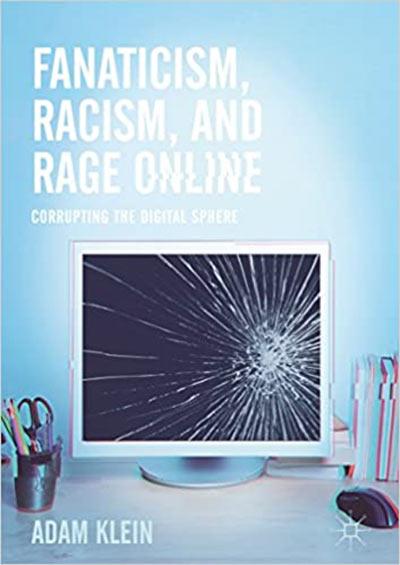

Fanaticism, Racism, And Rage Online: Corrupting The Digital Sphere
Adam Klein
Professor Communication Studies, NYC

What is the central theme of your book?
My book explores how digital hate culture infiltrates the web's mainstream spaces; sifting through our political blogs, social networks, and information sites, to spread extremist discourses.
What inspired you to write this book?
Much of my work in propaganda studies has focused on hate speech, political extremism, and more recently, terrorist communications, as each of these seem to be surfacing and advancing in unprecedented ways within mainstream culture.
Why is this book important in your field? What does it contribute to the current body of knowledge on its topic?
Much research on the Internet has explored the ways it has further democratized information and politics on a global scale. The blogosphere, for example, has allowed everyday citizens to join in civic debate and journalism, rather than just being spectators. But the other side of this democratic sphere, which my book explores, is how hateful and hostile agencies have been able to grow in the same networks, and gradually corrupt some of them. We find a lot of extremism in our social networks and popular blogs today, and that is an important area to investigate because these online venues lead directly to our public discourses surrounding critical cultural issues.
Tell me about a particularly special moment in writing this book.
Given the subject matter of this book, I spent a lot of time looking at hate websites (at home, on the train, at work, etc.) and then writing about the ideologies of racism and bigotry. So when I came to the last chapter on "Preserving our Digital Sphere," which explores the ways that educators, students, organizations, and everyday web users are taking steps to combat online hate, it was a much needed positive perspective. Another gratifying moment in writing this book came upon its completion. I was honored to receive book endorsements from those who work in anti-hate advocacy, such as Mark Potok of the Southern Poverty Law Center.
What is the one thing you hope readers take away from your book?
After reading this book, I hope that readers will still look at the Internet as a powerful democratic space, but also understand that we are the gatekeepers of this medium. That means everyday web users must be critical of its content, skeptical of some of its authors, and protective of its shared spaces.
What other books have you had published?
In 2010, I wrote a more narrowly-focused book titled, A Space for Hate: The White Power Movement's Adaptation into Cyberspace. It was published by information studies publisher, Litwin Books.
Fun Facts
When did you join Dyson?
September 2013
What motivates you as a teacher?
It is very inspiring to watch students begin to make those big connections and recognize the ways that mass media intersect almost every aspect of life today. As a teacher, I try to develop students' critical thinking, and understanding of how media thread through our powerful institutions of culture and politics, and influence the issues of the day.
What do you do in your spare time; to relax/unwind?
Fish, kayak, and follow the daytime soap that is politics today.
What are you reading right now?
Jo Nesbo's The Leopard.